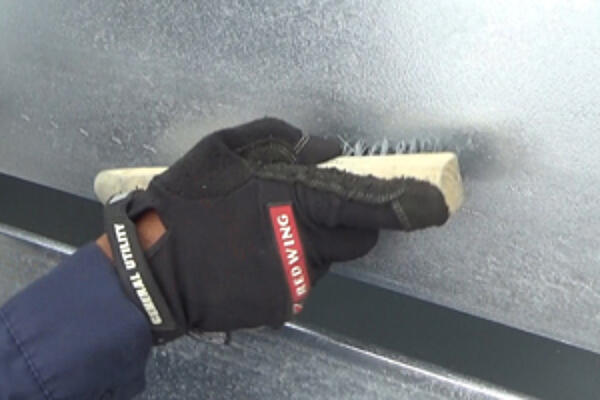Adhesives & Stickers on HDG
What adhesives and stickers are suitable over HDG?
Hot-dip galvanized (HDG) steel, like many metal surfaces, has a reputation for being difficult to bond with or stick to. Masking tape, packing tape, white/craft/wood glues, Super Glue, Krazy Glue, hot glues, wallpaper adhesive, and mounting putty can lose strength over time when applied over hot-dip galvanizing and are not likely to adhere long-term. However, proper surface preparation and selection of an appropriate adhesive can be used to achieve successful bonding to hot-dip galvanized steel.
Types of Adhesives for Use Over HDG
In general, hot-dip galvanized steel responds best to an adhesive which is flexible and has high peel strength and impact resistance. There are many available adhesives appropriate for use with hot-dip galvanized steel, including rubber-based and resin-based adhesives. However, adhesives that contain natural rubber, cellulose acetate, cellulose nitrate, polyvinyl acetate, ethyl cellulose, polyvinyl chloride, or natural gums are not recommended for use with hot-dip galvanized steel.
Most common Types of Adhesive for hot-dip galvanized steel:
- two-part no-mix acrylics (metal-bonding or industrial formulations)
- two-part mix acrylics (Loctite AA H8600, and other industrial formulations)
- two-part epoxies (metal-bonding or industrial formulations)
- polyurethane glues (Gorilla Glue, Grizzly Glue, Elmers Polyurethane Glue, and other industrial formulations)
Some acrylic and polyurethane adhesives are also available in industrial-strength tape and sticker form. These products can be used successfully on smooth surfaces if the formulation is specifically designed for use with metals or hot-dip galvanizing. Other labels, stickers, duct tapes, office tapes, and vinyl stickers can also be applied successfully to smooth surfaces which have been cleaned, provided they are made with high-quality acrylic or rubber-based adhesives. However, for all tapes and stickers, it can be difficult to achieve long-term adhesion over a rough surface or one that has not been cleaned.
Surface Preparation

No matter what type of adhesive product is used, preparation of the hot-dip galvanized surface is necessary to ensure a long-lasting bond. There are many similarities when preparing the hot-dip galvanized surface for placement of adhesives or for painting. If needed, the specification ASTM D6386, Preparation of Zinc (Hot-Dip Galvanized) Coated Iron and Steel Product and Hardware Surfaces for Painting, can be referenced as a guideline for detailed steps related to preparation of the HDG surface for adhesives.
Typically, non-structural adhesives (rubber based types of cement, tapes, stickers, etc.) require a clean surface free from dust, oil, grease, and loosely bonded corrosion products. Degreasing and cleaning can be performed in accordance with SSPC-SP 1 Solvent Cleaning.
Higher strength adhesives may require light abrasive cleaning (wire brushing or sanding) prior to degreasing to remove any zinc corrosion products and/or provide a textured surface. Be careful not to over-roughen the surface or remove too much zinc as to negatively affect the long-term corrosion resistance. Additionally, the use of an adhesive primer or etch primer (compatible with the adhesive product) may be recommended by the manufacturer for superior adhesion.
If maximum surface cleanliness is required, chemical cleaning using an acid rinse can be applied after degreasing. However, the use should be controlled to minimize attack on the coating, and thorough rinsing should be performed twice with fresh water to ensure all corrosive chemicals are removed.
Application
If possible, adhesives should be applied immediately after surface preparation and drying to minimize the formation of additional zinc corrosion products which can affect adhesion for some products. Where applicable, follow the manufacturers recommendations regarding application method, surface preparation, curing, and clamping.
© 2026 American Galvanizers Association. The material provided herein has been developed to provide accurate and authoritative information about after-fabrication hot-dip galvanized steel. This material provides general information only and is not intended as a substitute for competent professional examination and verification as to suitability and applicability. The information provided herein is not intended as a representation or warranty on the part of the AGA. Anyone making use of this information assumes all liability arising from such use.

